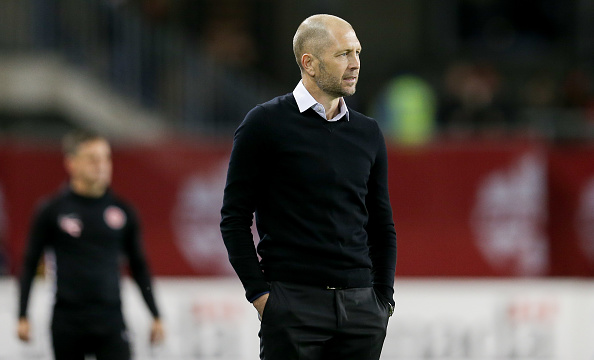
After an ineffective 60 minutes in a CONCACAF Nations League match against Canada, Christian Pulisic was inconsolable as he sat on the bench following his early substitution. Coach Gregg Berhalter tried to approach the Chelsea winger, but he wasn’t having any of it.
— Alexander Abnos (@AnAbnos) October 16, 2019
For those watching on TV that night, you could feel the exasperation through the screen. U.S. men’s soccer fans probably felt the same way, too. I struggle to remember a time when the USMNT were more frustrating to watch than they are now. Of course, the infamous loss to Trinidad & Tobago two years ago is worse, but the 2-0 defeat to Canada — the Americans’ first loss to their northern neighbors since 1985 — hits differently.
Berhalter’s arrival last December was supposed to mark the shift to a ball-dominant, attacking style of play that’s meant to make the Americans more ruthless and entertaining to watch than ever before. Tuesday night showed us we’re not getting that at all. Rather, Berhalter’s squad looks confused. The regimented, build-from-the-back philosophy that Berhalter has tried to plug-and-chug into the USMNT is not working, mainly because most of the players in the national pool have never played it before. Furthermore, I struggle to see a scenario where the team comprehends Berhalter’s hackneyed tiki taka to a level where it’s effective against talented opponents.
The bad coaching extends beyond the results, however. Like the last time I wrote about a USMNT crisis, the players suffer greatly, as well. Save for a couple exceptions, the player pool entering this World Cup cycle is completely new and much younger. From Weston McKennie and Tyler Adams to Tim Weah and Josh Sargent (and obviously Pulisic), it’s also clear that this generation is more talented than those of decades past. Unfortunately, the tactics Berhalter is trying to shove down their throats is a waste of their talent.
As I said earlier, Berhalter is a proponent of rigid attacking patterns when on the ball, which, to a degree, is a tenant of the popular philosophy Pep Guardiola has championed at every club he has managed. When done right, as Guardiola has shown, it can have devastating results. Berhalter’s iteration of this style — focusing on midfield diamonds and overloads on the wings, which is pretty standard — was at its best in 2015 with the Columbus Crew. The Crew had one of the most potent attacks in Major League Soccer, scoring 58 goals in the regular season and tearing apart defenses en route to an MLS Cup Final appearance.
With proper training, player development and recruiting, tiki taka can be successfully implemented at most half-decent clubs. However, when it comes to international soccer, developing a high-maintenance play style like tiki taka is close to impossible. Coaching staffs get limited time with the players, and their squad selection severely restricted compared to the club level, what with having to pick players from their country and all. What this ultimately produces is a version of tiki taka that’s rushed, awkward looking and just… bad.
You could see it on the field Tuesday. Players were fighting their natural instincts to play formulaic passing patterns they were taught in training. In result, attacking progressions were a couple touches slow, and moves would break down after three or four passes. The USMNT had a pass accuracy of 71 percent in their attacking half, an awful rate for the type of soccer Berhalter wants to be playing. At its worst, tiki taka is extremely predictable and easy to shut down, and this is tiki taka at its worst.
Berhalter should have seen this coming, too! As an international coach, you need to have uncanny knowledge of your player pool — their strengths, weaknesses, tendencies and respective club environments. Berhalter should have known that all of his most talented players aren’t passing wizards (save for Pulisic in close quarters, as he thrives as a link player). The tactics most of his players are exposed to at their clubs aren’t even close to tiki taka. If Berhalter wanted to stroke his ego and implement some “advanced” tactics, the USMNT would be better suited counter-pressing like Jurgen Klopp’s Liverpool. The players are athletic enough, and the Americans who would play pivotal roles in that system — Pulisic, McKennie and Adams — are already familiar with it.
But Berhalter is an ideologue, so he’ll never do that. He’ll continue to preach his diamonds and overloads, stubbornly misusing the abilities of his best players. Consider this: Berhalter’s philosophy will work without a hitch against Cuba, a nation that bleeds its most talented players every international break through defection. But when the competition takes a slight level up in Canada, which — player for player — is far less talented than the US (and this is its most talented team ever!), everything falls apart and the Americans look lost. In other words, Berhalter’s coaching is good enough to beat CONCACAF fodder. Nothing more.
Like I said two years ago, Pulisic doesn’t deserve this. Now, he’s not the only one suffering; U.S. Soccer’s ineptitude is beginning to infect the rest of his generation. So it goes.






